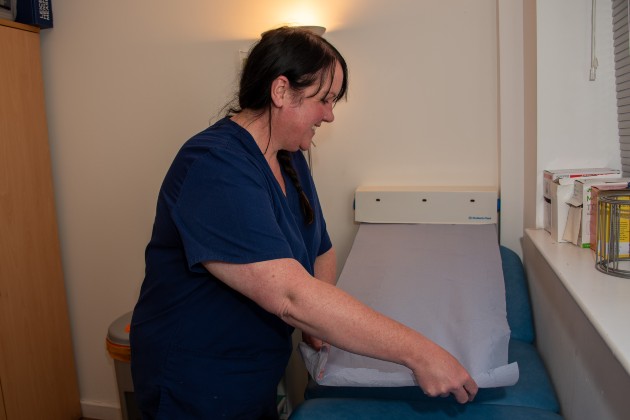For children many miles away from home comforts, the school medical centre where Sarah, a registered nurse, and Olivia, a health care assistant, work, is a safe and welcoming space.
The young people who study at the independent school where Sarah and Olivia work live different lives to many other young people in the UK. Many are international students and most live on-site, so while they’re focusing on their studies, they also need to look after themselves away from the familiarity of their homes.
The challenges these young people face can be different from those experienced by other children the same age who still live at home. So, for Sarah and Olivia, ensuring they’re cared for, and their wellbeing is protected, is essential.
Students can attend from 14 years old to study for their GCSEs. Therefore, age-appropriate advice is essential.
“We always put the students first – and they know that. We offer a trusted place where students can just come for a chat or a cup of tea if needed,” Sarah says.
The nursing team
Sarah and Olivia make a formidable team, on the frontline of supporting students. They work alongside a wider student support network, which includes a wellbeing officer, the safeguarding team and boarding staff, to deliver care to students.
By accompanying students to medical and dental appointments, Olivia has had the chance to get to know them well, and they in turn put their trust in her.
“Each student is encouraged to fulfil their own unique potential, and as a nursing team we do everything we can to help all students thrive,” she says.
How do Sarah and Olivia help with students’ wellbeing?
They provide a medical induction for all students when they first start at the school so they’re aware of all the help, support and guidance that’s available.
Then, throughout the students' time at the school, they encourage open dialogue about wellbeing and mental health, even if this kind of discussion is new to them.
Humour is a useful tool, along with a strong desire to provide the best support they can.
Social media can be a worry for many of the students
“There’s less of a stigma relating to mental health now, which is a great thing,” says Sarah, who’s also concerned about the additional demands modern technology brings.
"Social media can be a worry for many of the students. It distorts perceptions and makes it seem like everybody else is doing brilliantly. We know that this isn’t always the case, but that’s what they see,” she says.

Another issue that has an impact is tiredness, which is something the team is trying to address by explaining the importance of sleep.
“Instead of sleeping, some students go straight on their phones once they’ve finished studying.
“They tell us they only need four or five hours of sleep a night, so education about sleep hygiene is crucial,” Sarah says.
The school also provides a supportive environment. Students can choose to get involved with extra-curricular activities and events that promote team building. Olivia says this has helped build a strong sense of camaraderie among students.
“They want to be the best, but not at the expense of others,” she says.
What does the nursing team do?
The team provides daily mental and physical check-ins, acute medical care, and helps students deal with chronic conditions. They manage daily medications, treat sporting injuries and deal with emergencies and family communications about health issues.
Students can drop in any time in term time between 8am and 4.30pm during the week, but 8am to 8.45am is set aside for medicine and sick note collections.
Students are also supported by house parents who are trained in first aid. They can administer medication when the nursing team is not available.
Boarding students are registered with a local GP and UK guardians are employed by parents of international students to oversee any issues. Students under the age of 16 are accompanied by Olivia or house parents to all appointments if guardians are unable to attend.
Making improvements
In the three years since Sarah’s been in post, she’s put training and go-to guides in place for issues such as diabetes, emergency care and sickle cell anaemia and moved to a digital records system.
It’s made a difference. Now students are triaged by the nursing team, appointments with the GP surgery are less frequent.

Olivia’s career is developing too, and she’s completed courses in a range of areas including sexual health, first aid, child protection, administration of medications, anaphylaxis and concussion training.
“Continuing professional development is something that is really important to me”, she says. “I’m now considering nurse training in the future.”
Sarah concludes: “It’s important to always put the students first. It’s hard work, mentally, physically and emotionally, but I’m always so proud to help them through their time here.”
Further information
Find out more about the RCN forums for nursing children and young people.








